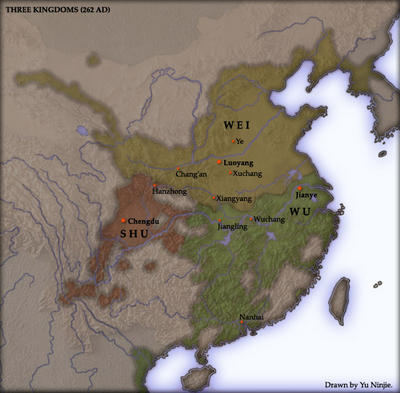A map of the Three Kingdoms, courtesy of Wikipedia

Records by Chinese emissaries to Japan from the Wei and Jin dynasties describe the contemporary Japanese as having customs similar to the people of the Wu kingdom. Furthermore, the Japanese referred to themselves as descendants of the Wu. Many words in modern Japanese have pronunciation similar to Wu words of the same meaning, reflecting an ancient tie with the Wu.
As an anecdote, I have found that people from Shanghai pick up Japanese quicker than those from northern China.
Traditional Japanese dress, popularly referred to as kimono, traces its roots to Wu-style dress. In fact, the proper word for "traditional Japanese dress" is gofuku (呉服), lit. "dress of Wu".
(As a side note, Manchu-style dress is often mistaken for traditional Chinese dress. The actual style of clothes the ancient Chinese wore was similar to kimono and the Korean hanbok. The Manchu subdued China circa 1640 and forced the Han Chinese populace to abide by their customs, including adopting Manchu-style dress and a pigtail hairstyle.)
Did you know...? =)

7 comments:
Thank you sir for another update about Chinese/Japanese history. I must say, I do enjoy these kinds of posts that you make, since I don't usually have easy access to resources about this topic. Oh, and sorry for getting so caught up in Thanksgiving weekend stuffies that I forgot about your correspondence.
Anyways, I saw the word "gofuku" and then the immature part of my mind kicked in, and I read it with a slightly differetn pronounciation than I think it should have. Although I still do think that it's kinda humourous, I'm interested in hearing what the actual pronounciation of that word is.
Reminds me of Chinese restaurant menus with bad English, which list one of the food items as "Fuk-yin style Noodles."
Hahaha! I didn't even notice it until you pointed it out :P I think it's humourous too.
The 'go' part rhymes with the 'co' in cook, and 'fuku' rhymes with Dooku. Try putting it together.
Hey Alan, did you notice there's a city named Wuchang on the map? =P
Arigato for the phonics lesson sir! And no, I did not notice the metropolis that is named similarly to a famous UW math prof who researches Claster Sampling. Wow, that's pretty cool!
Oh...and, I updated my blog as well...heh. I'll be deep in work for the next coming weeks. Bio is now my new favourtie course. :P
Too bad I can't comment on your blog :(
It has protection from Leopalace21.
what the? You can't comment? Why not sir...?
Post a Comment